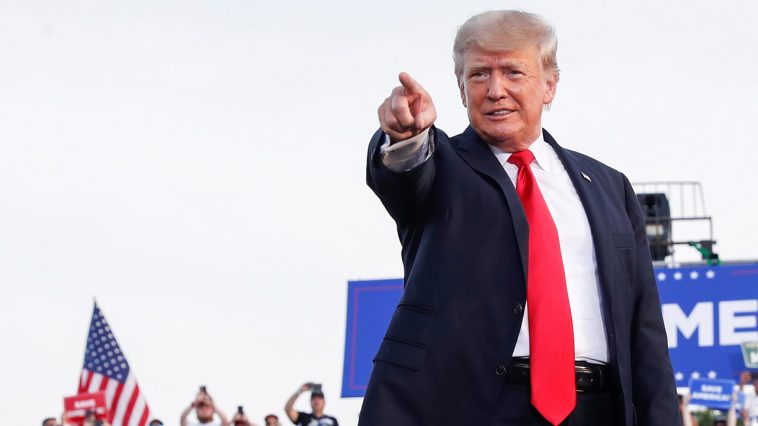LISTEN HERE:
The Supreme Court made the significant announcement on Wednesday to take into account a case that entered the scene via a participant of January 6, albeit revolving around defining the parameters of the ‘obstruction of an official proceeding’ charge.
This charge had been actively utilized by the Department of Justice to address those found guilty in the widely-discussed January 6 Capitol Riot. The judiciary’s decision is definitely a positive development for all those who were part of the events on January 6, such as the initiator of the case, Joseph Fischer.
This adjudication doesn’t only boost the morale of those who stood shoulder to shoulder with Fischer on the day of the riot, but it is also conducive for the 45th President of the United States, Donald Trump.
Trump is currently in the legal crosshair being targeted with the charge according to section 1512(c)(2) of the 2004 Sarbanes-Oxley Act. It’s worthy of note that this charge was primarily brought up against him by none other than the Special Counsel, Jack Smith.
The mentioned statute, visible in other legal instances, is traditionally deployed in scenarios that imply deception or concealment of evidence. Quite interestingly, here, its relevance with the circumstances around January 6 and its subsequent events has been queried. The implications of applying this statute to J6 defendants have led to relentless debates within the corridors of the judiciary.
The Department of Justice, on its part, has so far issued charges to a whopping number of 327 J6 defendants. All these indictments are pinned on the alleged obstruction of the official process that was to give the green light to the results of the 2020 election. A crucial point to consider here is that Fischer and his legal team are standing firm, arguing the inapplicability of the charge considering the situation’s unique nature.
The strong contention from Fischer’s team is that the alleged charge doesn’t fit the scene as it primarily pertains to instances of tampering or obliteration of evidence. Local judges from the DC area had, however, divergent opinions on this subject. Most of them presented differing views to Fischer’s legal theory, which essentially hinted at a broader need for consensus.
Notwithstanding the mainstream opposition, U.S. District Court Judge Carl Nichols sided with Fischer’s perspective and resolved to dismiss the charge against the defendant who was part of the J6 incident. This legal outcome did not sit well with the Department of Justice, leading it to appeal the decision. The action consequently spurred a response from the DC Court of Appeals, resulting in the overturning of Judge Nichols’ decree.
However, as one would expect in such high-stake legal matters, the matter didn’t end there. The decision was reversed, but not without expressions of differing opinions about the reach of the law. In fact, there was a distinct lack of consensus on how extensive the law’s jurisdiction should be, according to POLITICO. The on-going disputes amongst legal experts over this point have been pivotal in driving the case up to the Supreme Court’s doorstep.
The incongruences highlighted by POLITICO is essentially what ushered the case along the path leading to the Supreme Court. The apex body of justice in the country is now tasked with delineating the charge’s purviews. This includes deciding how much distance the prosecutors could have traversed to prove that J6 defendants acted beneath the legal standards during the transpired events of the day in question.
The uncertainties and multi-faceted interpretations surrounding this charge have resulted in the case falling within the purview of the Supreme Court. The focus now shifts to how the Supreme Court will interpret or define ‘corruptly’, a vital concept that lay at the heart of the charges against the J6 defendants.
One of the key aspects the supreme body will have to consider is how broad or narrow of an interpretation to give to prosecutors about what constitutes acting ‘corruptly’. The implications of this decision hold serious ramifications for both the prosecution and defense of those involved in the January 6 events.
It is important to note that the Supreme Court’s take on this issue could set precedents for future judicial interpretations of the statute. The decision they take is expected to shed more light on situations that can be considered as ‘obstruction of an official proceeding’, a move that is vital for maintaining the sanctity of constitutional processes.
This case is more than just about one interpretation; it’s about how we view the concepts underlying our judicial system and its ability to equitably adjudicate events like the January 6 incident. The legal implications will potentially go beyond the current cast of characters to impact how such cases are interpreted in the future.
While the Supreme Court has been presented with a challenging task, it has the potential to offer a clear precedent setting verdict for future cases. The decision could provide more clarity and consistency on the application of the Sarbanes-Oxley Act, specifically section 1512(c)(2), in circumstances similar to this one.
As events unfold, what remains certain is that this intriguing legal dispute will continue to grab headlines and shape public discourse. The Supreme Court’s decision on this matter will have considerable implications, shaping both current and future legal discourse.
It’s compelling to note that this story is actively developing, and will be continually reported on, fact-checking, and updating as more information comes to light. The unfolding of events is anticipatory, and the final verdict eagerly watched for, as it continues to add nuanced layers to the legal discourse surrounding the infamous events of January 6.



